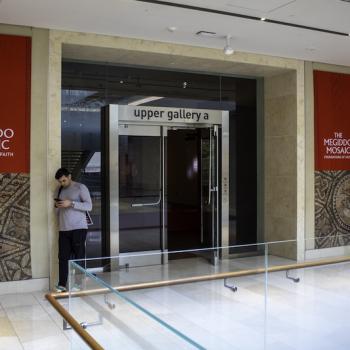
We just walked through the third week of Advent. In many mainline and Roman Catholic churches, the third Sunday of Advent not only focuses on “joy” but is called Gaudete Sunday, or “Rejoicing Sunday.” The theme of this Sunday focuses on “rejoicing” because of the joy we experience in Jesus. This theme is reflected in the readings for the third Sunday of Advent, which often include Philippians 4:4-6. Paul’s words in Philippians 4:4-6 challenge followers of Jesus to be a people of joy. Paul challenges followers of Jesus to be known by joy—overflowing with it and rejoicing in all things. During Advent, we rejoice because of what we have and experience in God. This joy shapes how we treat others, leading us to gentleness. Through Jesus, we know the joy God brings, and we rejoice because God’s presence is near. Our anxiety loses its grip as we embrace God’s abundance, accessed through prayer and thanksgiving.
In the first blog, I explored Mary’s prophetic hope, revealing how her song highlights God’s care for the humble. The next post reflected on the prophetic peace her song proclaims, confronting the proud, uplifting the marginalized, and breaking down barriers. Today, through Mary’s example, we are reminded that even as we wait, we rejoice—for the Lord is near, and God’s joy is abundant and overflowing for all humanity.
This Lead a Quiet Life blog on Patheos, explores living a quiet life (1 Thessalonians 4:11-12). The theme of joy in Mary’s song reflects the deep contentment and peace that comes from trusting God’s provision and presence, aligning with the call in 1 Thessalonians 4:11-12 to lead a quiet, faithful life. Just as Mary found joy in God’s work through humility and simplicity, pursuing a life of quietness and integrity fosters a similar joy rooted in God’s grace and purpose.
Mary’s Magnificat is more than just a song.
Mary’s song in Luke 1:39-56 is not just a worship song; it is a prophetic word, as we have seen in the past few weeks, but it is a song of exuberant rejoicing. Mary is singing prophetically through her joy. Her joy is rooted in being part of God’s work and because God is working in, with, and through her. Mary’s joy in Luke 1 is rooted in and celebrating God’s faithfulness, as she magnifies the Lord for lifting the humble, filling the hungry, and fulfilling the promises long hoped for.
Mary’s song is more than a personal expression of God’s presence—it reveals God’s heart for the humble and celebrates the transformative work happening through Jesus’ coming. Her words serve as a statement of faith, a doctrine, as she is sharing her new understanding and reinterpretation of familiar scriptures that she grew up with, combined with her understanding from the angel and the Holy Spirit in this journey. In Luke’s Advent narrative, Mary becomes a theologian, teacher, and prophet, casting a Spirit-filled vision of God’s promises fulfilled. Her song calls us to rejoice in God’s Kingdom, trust in God’s redemptive work, and embrace the joy and abundance of joy that God is bringing to all people.
Don’t take Mary’s words lightly, Theologian William Barclay describes Mary’s song as one of the “most revolutionary documents in the world.”
A look at verse fifty-three.
Read Luke 1:39-56 this week. Pay attention and see what grabs you this week that may not have stood out to you in the last few weeks. There are many aspects to this song. There have been glimpses of Mary’s journey, the promise of God’s mercy in each generation, and more. However, focus on verse “53” and this line from Mary’s Magnificat – “He has filled the hungry with good things but has sent the rich away empty.” In her song, we are drawn into a vision of profound and prophetic joy—a joy that satisfies the hungry, bringing spiritual and tangible goodness to those in need and leaving the proud and rich without. Mary is singing from a place of joy, and this joy comes from recognizing that God is fulfilling his promises among those who are in the most need.
In The Message version of this passage confesses that Mary is saying “The starving poor sat down to a banquet; the callous rich were left out in the cold.” Mary realizes this is why Jesus has come. This is what God has long promised: that those who are hungry will be filled with good things and those who have been in control and hoarded the wealth will be left without power and abundance. In Mary’s confession, we know that we can have joy, both spiritually and tangibly.
Again, Mary is quoting from Psalm 107:9 in this passage. Psalm 107 is filled with prophetic expectations for the fulfillment of God’s promises. It recounts how God’s people, wandering in wastelands—homeless, hopeless, hungry, and thirsty—cried out to God in their trouble and rebellion, and God delivered them. God guided them and gave them a place to settle, and from this newfound home, they praised God for his unfailing love. God’s deliverance is shown through satisfaction for the thirsty and tangible good things for the hungry. These were people in desperate circumstances—prisoners in oppression, sinful rebels, the enslaved, and the helpless—yet when they called out to God, their chains broke. In their broken state, they even loathed food and struggled to enjoy life, but God provided abundantly. Psalm 107 speaks of a land of plenty, with vineyards and farms yielding a fruitful harvest, meeting their needs in full.
Mary’s song echoes the themes of Psalm 107 because she saw its fulfillment in the coming of Jesus. She recognized that, through Jesus, God was satisfying the spiritually and physically hungry with good things and bringing deliverance to those in desperate circumstances. Just as Psalm 107 spoke of God guiding the wandering, breaking the chains of the oppressed, and filling the hungry with tangible blessings, Mary celebrated that Jesus embodied this promise. She saw in Jesus the fulfillment of God’s unfailing love—lifting the humble, providing dignity to the forgotten, and bringing hope to the hopeless.
Mary’s song magnifies the joy and faith of a God who not only remembers the downtrodden but also acts decisively to meet their needs and transform their lives. This is why she sang with such profound hope and rejoicing. In the first blog post, I shared that much of Mary’s song echoes Hannah’s song in 1 Samuel 2. Like Mary, Hannah declared that God had lifted her from her lowly state and worked in and through her to reveal God’s heart and purposes. She proclaimed, “Those who were full hire themselves out for food, but those who were hungry are hungry no more.” Hannah implies that those who had hoarded riches would now face hunger due to God’s justice, while those who lacked would be satisfied. Psalm 72 echoes this, where David speaks of the Messianic King, who not only rules with justice but brings tangible care for the needy and afflicted.
What Mary sings about is true in the life and ministry of Jesus.
We also see this fulfilled in the life and ministry of Jesus. In Jesus’ Kingdom Manifesto, the Beatitudes, Jesus declares, “Blessed are you who hunger now, for you will be satisfied” (Luke 6:21). Jesus was bringing about God’s promised deliverance, both in tangible and spiritual ways. In Luke 11, Jesus uses the image of a man knocking for bread to feed some visitors at night to illustrate the Kingdom of God, highlighting the need to ask for God’s blessings. In that passage, the man is motivated out of annoyance, not friendship. It seems the man would rather hoard his food rather than share it. However, Jesus teaches that God is in the business of giving goodness through others, and all we need to do is cry out. God gives out of friendship, not annoyance. Luke’s telling of that story also says that Jesus promised the Holy Spirit to those who ask, a blessing even greater than bread we should surmise. This also points to the spiritual blessing of the Holy Spirit—empowering us to live joyfully. To live by the Spirit is to live by joy, to find ourselves rejoicing in God’s goodness. Jesus also tells parables about the Kingdom’s feast, inviting the poor, the hungry, and the downtrodden, while those who hoard wealth ignore the invitation. In the story of the rich man and Lazarus, Jesus shows that those who receive good things in this life will face judgment in the next, while the forgotten, hungry, and thirsty find comfort.
Mary’s words shape much of what we see in Jesus’ ministry, from the feeding of five thousand to the breaking of bread at the Lord’s Supper. Jesus promised a banquet of fellowship, not for the powerful but for the humble. Even when the rich invited Jesus to their feasts, it was not to share a table but to lord power. In contrast, Jesus prepared a banquet of seafood abundance for fishermen who could catch nothing on their own. Through Jesus, God’s tangible and spiritual blessings are poured out on the thirsty, the hungry, and the broken.
Mary knew this wasn’t just something God did to Abraham’s people. But God has always done. That was taking new meaning in this generation as God was doing it again through Jesus, the very messianic messenger she was carrying in her. God would do this forevermore as a result of Jesus’ coming. Mary knows that there is joy in Jesus’ coming because Jesus’ birth brings joy because Jesus is God bringing both the spiritual and tangible answers to the needs of a broken world. God is bringing provision for the spiritually and physically hungry – and all those who suffer.
I love how Theologian Leon Morris describes this passage, noting, “There is a revolutionary note about filling the hungry and sending the rich away empty… Mary sings of a God who is not bound by what people do. He turns human attitudes and orders of society upside down.” The Christmas story, as Mary knew and proclaimed, reveals a God who upends the world’s expectations. God’s goodness and good news break into the world, bringing joy that transforms and restores in spiritual and tangible ways.
What Mary sings about is a joy for us as well.
Through the empowerment of the Holy Spirit, the gift Jesus left for us, we see that Jesus continues to feed the hungry both tangibly and spiritually today. The Holy Spirit equips and empowers believers to serve as the hands and feet of Jesus in the world, granting us the authority, compassion, wisdom, and discernment needed to represent God’s Kingdom in tangible and spiritual ways. As ambassadors of God’s reign, we participate in the Kingdom by praying, performing acts of compassion, acts of spiritual deliverance, meeting physical needs, and advocating for justice and the hungry. When we share rather than hoard, give out of love rather than obligation, or when we act on an impression to help someone, we are living out Jesus’ command to care for the least among us. Additionally, Jesus feeds the spiritual hunger of those who seek God, offering the bread of a transformed and eternal life through prophetic words, the scriptures, prayer, and the Holy Spirit, sustaining believers with God’s presence and love.
For us, in Mary’s understanding of who God is and what God was doing, there is a revolution in how we think about money and resources. In a society that isn’t focused on Christ, people are mainly concerned with getting as much as they can for themselves. But in a Christian way of living, a way of living after the birth of Jesus, no one should have more than they need while others struggle to get by. Everyone should have enough, but also be willing to share with others. The beauty of Mary’s song is that it carries this powerful message. Christianity brings change, both in individuals and in the world – spiritually, economically, and physically – all which we see in the life and ministry of Jesus – and all Jesus implies for us as he sends us to the ends of the earth to teach and do all he taught and did.
Three practical takeaways from Mary’s promised joy.
There are three practical takeaways we can take from this song and prophetic challenge of joy that Mary sings in Luke 1.
- This Advent season calls them to rejoice in God’s presence and promises: Mary’s joy comes from recognizing God’s promises are being fulfilled through Jesus. This Advent, we rejoice because God is near, and His promises of hope, peace, and joy are unfolding. Even in life’s chaos, we choose joy by remembering God’s faithfulness. We celebrate joy in others and take time daily to reflect with gratitude, trusting that God’s work is ongoing, even if not yet complete.
- This Advent season calls us to live with generosity and compassion: Mary’s song reveals God’s reversal of societal norms—lifting the hungry and humbling the rich. As followers of Jesus, we are called to reflect this by serving and uplifting those in need. This Advent, let Christ’s joy move you to generosity, kindness, and service. Look for ways to offer tangible hope and be part of God’s work in blessing others.
- This Advent season calls us to embrace the “Already and Not Yet” of God’s Kingdom: Advent reminds us that God’s Kingdom is breaking in, though not yet fully realized. We rejoice in the present and extend God’s blessing, but we also look ahead to God’s eternal promises. Our hope isn’t defined by current struggles but by God’s faithfulness and the renewal to come. As we recall God’s work in our lives and in scripture, we are strengthened to trust in the greater fulfillment that awaits.
We must come to understand what joy is.
In her song From a Spirit-filled place, we see Mary model joy. Joy for Mary is knowing what God is up to, even though she doesn’t see it all yet. Mary knows that joy will be found for those who hunger will hunger no more. We as followers of Jesus, those who have experienced the Holy Spirit and the power of God, and those who have a relationship with God, now know joy.
Joy is contagious. People saw the joy in Jesus he had with the Father, in the lives Jesus touched there was joy, and joy was in the lives of His followers. Joy is given to us by God, through a relationship with Jesus. Jesus tells His followers that He has shared His truths with them so that His “joy may be in you, and that your joy may be complete” (John 15:11). Joy is something we pray for others. Paul prays for the church in Rome to be filled with “all joy and peace” as they learn to trust in God. Joy is also a sign of spirit-filled living, which is why it is listed as a fruit of the Spirit (Galatians 5:22-23). Joy is found in the worship of God, which is why Paul encourages the Thessalonians to “rejoice always.” Joy isn’t simply happiness, although, in heaven, it will be made complete and a state of being. Joy is radical contentment despite our troubles, and it is a contagious extension of God’s goodness and good news to others. Joy’s job is to shape how we look at our problems. This is why James says, “Consider it pure joy, my brothers and sisters, whenever you face trials” (James 1:2), because God is working in us, and joy is contentment with what God is doing. It transforms how we view our problems.
Joy is found in Jesus and only in Jesus. But it is a joy for everyone. Mary sees that here as she quotes Psalm 107. That’s why the angel tells the shepherds that Jesus alone will “cause great joy for all people” (Luke 2:10). There is hope in this joy for everyone, not just a select few, but Jesus is the source of Joy, we won’t find it anywhere else.
While Mary and the shepherds physically saw Jesus, we don’t need to see Him physically to experience and reflect His joy. Peter says that, though we haven’t seen Jesus, by believing in Him, “we are filled with an inexpressible and glorious joy” (1 Peter 1:8). Believing in Jesus, we will be filled with joy along the journey.
Finally, joy is eternal. It reaches its fullest expression when we stand before God and He says, “Well done, good and faithful servant! You have been faithful with a few things; I will put you in charge of many things. Come and share your master’s happiness” (Matthew 25:21).
Some closing thoughts.
Mary’s song celebrates God’s faithfulness to the forgotten, lifting the humble and filling the needy with abundance. This prophetic joy is more than happiness—it’s God’s goodness transforming lives. Joy meets the deepest needs of the desperate and offers contentment to those longing for justice. The Christmas story reveals this joy through Jesus, inviting us to reflect God’s abundance to others.













